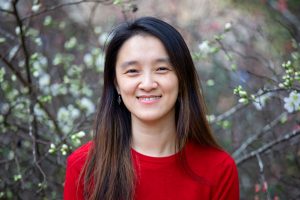Min Tang is a doctoral student in philosophy, with a specialization in philosophy of mind, language and cognitive science. She holds a Ph.D. in philosophy of science and technology from Renmin University of China, a master’s degree in philosophy from Western Michigan University, and a bachelor’s degree in mathematics and applied mathematics from Lingnan Normal University.

What made you choose UNC-Chapel Hill when deciding on a program/place to study?
Compared to other programs I got in, I found one of the most impressive aspects of UNC was the Royster Society of Fellows at The Graduate School. The vision, opportunities and practices it offers for interdisciplinary collaboration are genuinely amazing. I remember the day I attended the Royster orientation, our former associate dean, Sandra Hoeflich, gave us an extremely stimulating speech in which she shared with us how her doctoral study and work experiences led her to her role within the interdisciplinary Royster program. Our former staff member, Jennifer Olson, patiently explained to us how the Royster fellowship supported us throughout our studies. Our senior fellows told us about various projects they had created with the support of the Royster Society. After listening to and talking with our dean, staff and fellows, I had the feeling that the Royster Society would be one of my strongest support systems at UNC, academically and personally. In fact, many of the strong professional and personal relationships that I have are established within and through the Royster Society. Our previous Royster Distinguished Professor, Marsha Collins, spent hours giving me specific guidance on how to design and develop my first interdisciplinary course. Our current associate dean, Jennifer Gerz-Escandón, generously shared with me her experiences and numerous resources on language policy and programs in the U.S. and Europe. Our current director of fellowships, Julie Montaigne, showed us effective interpersonal and communicative skills. I cannot imagine my life at UNC without the Royster Society.
Tell us about your research.
My current research focuses on the transformative effects of learning a new language, which integrates the philosophical studies of transformative experience and aesthetic appreciation, the psychological investigations of language perception and attachment, as well as the ethics of translating philosophical texts from classical Chinese into modern English. In my dissertation, “Varieties of Transformation in Learning a New Language,” I provide a philosophical analysis of how learning a new language is a distinctive kind of transformative experience, contributing a new study to the current literature on transformative experience and expanding its philosophical implications. Learning a new language, I argue, results in three varieties of transformation, which I call phenomenal, aesthetic and conceptual transformations. These transformations show the crucial knowledge and ethical implications of learning a new language. In the near future, I would like to extend my research on learning natural languages to non-natural languages. In particular, I would like to explore how learning non-natural languages (e.g., programming languages) transforms the ways we process information, communicate and establish interpersonal relationship, and what the ethical implications of machine translation and natural language processing would be.
What are some of your favorite places and things to do in your home country?
I grew up in Zhanjiang, which is located in Guangdong province and neighboring the South China Sea. It is a modern city with beautiful harbors and rich natural resources. Walking along the seashore, wandering around the farmers’ markets, and tasting a variety of tropical fruits and authentic Cantonese dim sum are extremely enjoyable. Listening to Cantonese and the Leizhou dialect on the street is definitely my secret pleasure. I love Beijing as well, where I did my first doctoral work. Two of my favorite places in Beijing are the Palace Museum and the National Art Museum of China. I spent long hours in these two places whenever I had time. Standing in awe of traditional paintings and historical architectures made me feel that time had stopped running. Being surrounded by modern scriptures and new media art brought me back to reality. Last but not least, making traditional Beijing food with my relatives in Beijing was always pure joy.
What are you hoping to accomplish with your Carolina degree?
I hope that I will be a professor of philosophy, making contributions to the field and letting more people know the values and impact of philosophical thinking. I believe that there are genuinely interesting philosophical questions that matter to us. My department taught me what these questions could be and how to explore them. I also believe that we can address these questions through rigorous conceptual analysis and creative integration of resources and perspectives from other disciplines. Thirdly, I believe that teaching informs and inspires research.
